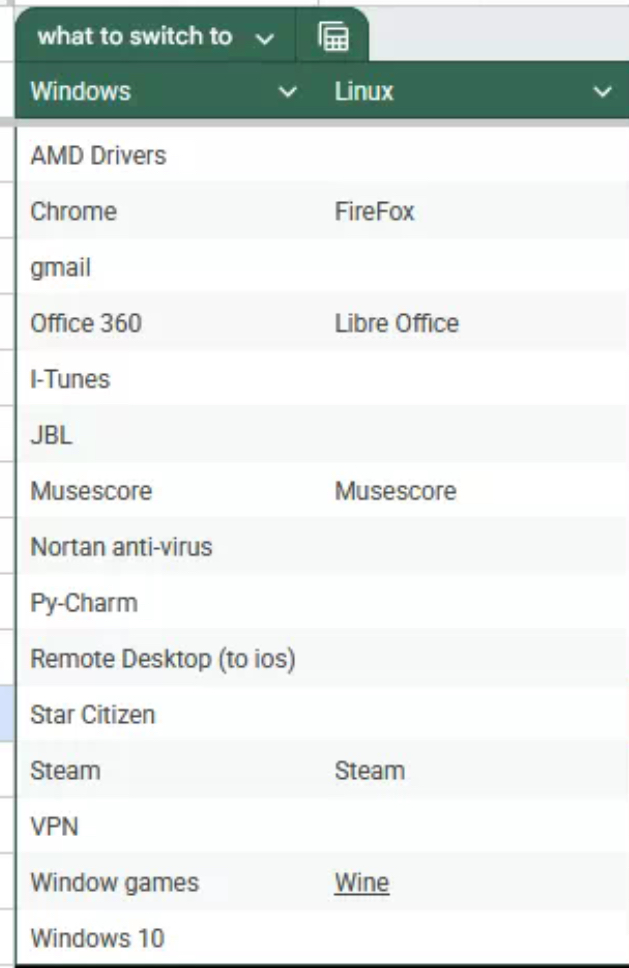this post was submitted on 24 Mar 2025
308 points (92.8% liked)
Linux
52773 readers
956 users here now
From Wikipedia, the free encyclopedia
Linux is a family of open source Unix-like operating systems based on the Linux kernel, an operating system kernel first released on September 17, 1991 by Linus Torvalds. Linux is typically packaged in a Linux distribution (or distro for short).
Distributions include the Linux kernel and supporting system software and libraries, many of which are provided by the GNU Project. Many Linux distributions use the word "Linux" in their name, but the Free Software Foundation uses the name GNU/Linux to emphasize the importance of GNU software, causing some controversy.
Rules
- Posts must be relevant to operating systems running the Linux kernel. GNU/Linux or otherwise.
- No misinformation
- No NSFW content
- No hate speech, bigotry, etc
Related Communities
Community icon by Alpár-Etele Méder, licensed under CC BY 3.0
founded 5 years ago
MODERATORS
you are viewing a single comment's thread
view the rest of the comments
view the rest of the comments

Why do you find it concerning from the perspective of using the distro? the software is still open source, and it's not like they're benefitting from user-count. Redhat makes its money selling support, if you don't like their business model, simply don't pay them for support, and you get all the benefits and none of the ethical qualms.
I don't think these ethical fears are grounds enough when completely unsubstantiated to be recommending a distribution that's fundamentally worse for beginners.
"Why do you find it concerning...?" Because with just increasing the user base, greatly benefits this corporation, even though we don't give a penny for using Fedora. This is why Google flooded schools with "free" Android netbooks and why Microsoft winks at hundreds of millions of pirated Windows... a larger customer base benefits you by suffocating the competition... this applies to both open or closed software. Red Hat is not just a corporation after money, I am 100% fine with that, it is just one that goes after military contracts therefore lobbies for military causes as a good PR with its buyer. IBM does the same... and Amazon, HP, etc. Not all American companies are like that, not at all, but these are. Then is the problem how the US, more and more, is relying in sanctions to hurt foreign entities and peoples... this can be not only by forbidding the export of software but also altering its content.
Open software is great and a reassurance that no altering can go unnoticed but let's be realistic, when is the last time some entity, let alone non-American) audited a entire package of Fedora, let alone every single version of it, or smaller software. Debian is a US based but highly global collaborative distro so malice is far harder to introduce and gone unnoticed. Mint is based on Ireland so hardly with an militaristic goal, either by maintainers, financiers or country. My current OpenSUSE is far more susceptible to tampering than Mint, but it still cannot reach the knees of Fedora on susceptibility. We should look at Android and Chrome... It is free, opensource, but the fact that Google de-facto controls it, uses it to dominate the landscape, first by suffocating competition and then, to steer where it wants the technology to go to. Therefore that it is opensource is great, we can check the code once in a while,
I am one of the very few that recognize Fedora is ahead of Ubuntu deviates yet I think we should steer clear from it. To newcomers, I tell them the reality; in my opinion Fedora is the marginally the best linux distro, now, if ethics (and a little bit privacy) is one of the motives to move away from Windows, you should consider distros not so heavily relying on the US and Mint usually comes first in my mind for them. We don't want to get to the point that Fedora is so vastly superior to all the rest of Linux distros, that will be the only game in town... like we did by solely go after Android (I really miss what my Nokia N9's Meego could have become!)
well said, but i wonder how much it will matter in the future considering that the kernel group itself has so willingly kowtowed to american hegemony in its recent expulsion of russian developers from the kernel maintainers group to align itself with american export controls.
So true eldavi! The "Russian kernel maintainers" event was a big red flag for me. I know Linux had no choice to expel them due to the law, but the fact that Linus Torvalds did not thank them for the job done (if he kept them till then , Torvalds clearly has see their contributions as beneficial), and Torvalds did not try to reassure the audience that hardly any code is posted unsupervised in a open source... that was the main scandal for me, far more than the ban. I had known that Torvalds was a rude person, many maintainers are and I am ok with that, but that event showed me that not only easily folds to government requests, but that also he believes it is ok to do these things against people you don't like...
In his own words; "please use whatever mush you call brains. I'm Finnish". I don't think he referred to the Finland that thrived the most in its history during the period of maintaining a strong military culture yet NEUTRAL (1948-2023) and away from NATO, but he deeply meant the Finland that sided with Germany in the early 40s in order to stick-it to Moscow. Would he stop at firing developers or would be willing to do more for the cause? I bet many wonder.